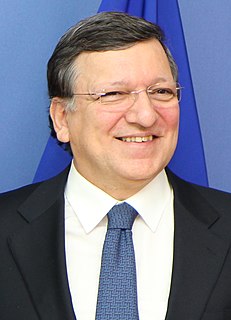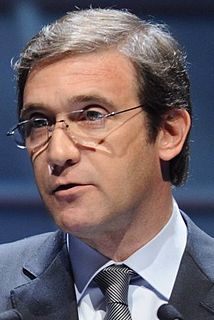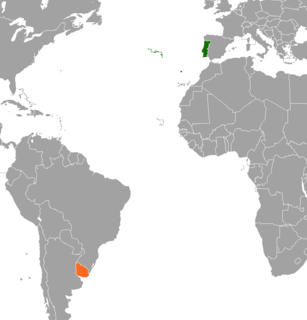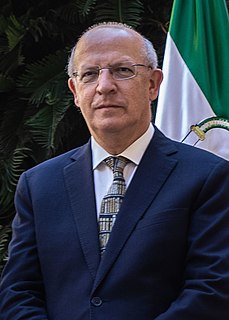| |||||
| Centuries: | |||||
|---|---|---|---|---|---|
| Decades: | |||||
| See also: | List of years in Portugal | ||||
The year 2007 in Portugal.
| |||||
| Centuries: | |||||
|---|---|---|---|---|---|
| Decades: | |||||
| See also: | List of years in Portugal | ||||
The year 2007 in Portugal.

Foreign relations of Portugal are linked with its historical role as a major player in the Age of Discovery and the holder of the now defunct Portuguese Empire. Portugal is a European Union member country and a founding member of NATO. It is a committed proponent of European integration and transatlantic relations. Augusto Santos Silva is the current Minister of Foreign Affairs of Portugal.

José Manuel Durão Barroso is a Portuguese politician and university teacher, currently serving as non-executive chairman of Goldman Sachs International. He previously served as the 11th President of the European Commission and the 115th Prime Minister of Portugal.

António Luís Santos da CostaGCIH is a Portuguese lawyer and politician serving as the 119th and current Prime Minister of Portugal since 26 November 2015, presiding over the XXI (2015–2019) and XXII Constitutional Governments (2019–present). Previously, he was Secretary of State for Parliamentary Affairs from 1995 to 1997, Minister of Parliamentary Affairs from 1997 to 1999, Minister of Justice from 1999 to 2002, Minister of Internal Administration from 2005 to 2007, and Mayor of Lisbon from 2007 to 2015. He was elected as Secretary General of the Socialist Party in September 2014.

José Sócrates Carvalho Pinto de Sousa, GCIH, commonly known as José Sócrates, is a Portuguese politician who was the Prime Minister of Portugal from 12 March 2005 to 21 June 2011. For the second half of 2007, he acted as the President-in-Office of the Council of the European Union.

The Third Portuguese Republic is a period in the history of Portugal corresponding to the current democratic regime installed after the Carnation Revolution of 25 April 1974, that put an end to the paternal autocratic regime of Estado Novo of António de Oliveira Salazar and Marcello Caetano. It was initially characterized by constant instability and was threatened by the possibility of a civil war during the early post-revolutionary years. A new constitution was drafted, censorship was prohibited, free speech declared, political prisoners were released and major Estado Novo institutions were closed. Eventually the country granted independence to its African colonies and begun a process of democratization that led to the accession of Portugal to the EEC in 1986.
The first summit meeting between the European Union (EU) and Brazil took place in Lisbon on 4 July 2007. At the summit, Brazil was granted special partnership status with the EU.

Malta–Portugal relations are foreign relations between Malta and Portugal. Malta has an embassy in Lisbon and 4 honorary consulates. Portugal is accredited to Malta from its embassy in Rome, Italy. Both countries are full members of the European Union and of the Union for the Mediterranean.

The Portuguese legislative election of 2009 was held on 27 September, to renew all 230 members of the Assembly of the Republic. The Socialist Party, led by incumbent Prime Minister José Sócrates, won the largest number of seats, but didn't repeat the overall majority they gained in 2005.

The current and historical relations between the Argentine Republic and the Portuguese Republic, have existed for over a century. Both nations are members of the Organization of Ibero-American States and the United Nations.

The signing of the Treaty of Lisbon took place in Lisbon, Portugal, on 13 December 2007. The Government of Portugal, by virtue of holding Presidency of the Council of the European Union at the time, arranged a ceremony inside the 15th-century Jerónimos Monastery, the same place Portugal's treaty of accession to the European Union (EU) had been signed in 1985. Representatives from the 27 EU member states were present, and signed the Treaty as plenipotentiaries, marking the end of negotiations that began in 2001. In addition, for the first time an EU treaty was also signed by the presidents of the three main EU institutions. After the main ceremony, the heads of state and government took a ride on a decorated Lisbon tram together, symbolising the brotherhood of European countries on the path of European integration.

The Portuguese legislative election of 2011 was held on 5 June, to elect all 230 members of the Assembly of the Republic. Pedro Passos Coelho led the centre-right Social Democratic Party to victory over the Socialist Party, led by incumbent Prime Minister José Sócrates. Despite a historically low turnout of less than 60% of registered voters, the right-wing won a clear mandate, winning nearly 130 MPs, more than 56% of the seats, and just over 50% of the vote. While the People's Party, continuing the trend they began in 2009, earned their best score since 1983, the Social Democrats exceeded the expected result in the opinion polls and won the same number of seats as they did in 2002, when the PSD was led by José Manuel Durão Barroso. Of the twenty districts of the country, Pedro Passos Coelho's party won seventeen, including Lisbon, Porto, Faro, Portalegre, Castelo Branco, Coimbra, Santarém and the Azores, that tend to favor the Socialist Party.

Maria João RodriguesGOIH is a Portuguese academic and politician who served as Member of the European Parliament and Vice-President of the Group of the Socialists and Democrats (S&D) from 2014 until 2019. Since 2017 she is also President of the Foundation for European Progressive Studies (FEPS).
Events in the year 2005 in Portugal.

Portugal–Uruguay relations refers to the current and historical relations between Portugal and Uruguay. Both nations are members of the Organization of Ibero-American States and the United Nations.
Alberto Carneiro was a Portuguese artist.

Augusto Ernesto dos Santos Silva is a Portuguese sociologist, university professor, and politician. Since November 2015, he has been the Portuguese Minister of Foreign Affairs, in the XXI and XXII Constitutional Governments led by Prime Minister António Costa.
The following lists events during 2016 in Portugal.
Events in the year 2017 in Portugal.
Events in the year 2018 in Portugal.
Events in the year 2019 in Portugal.